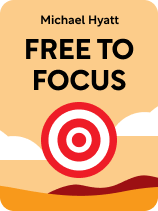

This article is an excerpt from the Shortform book guide to "Free to Focus" by Michael Hyatt. Shortform has the world's best summaries and analyses of books you should be reading.
Like this article? Sign up for a free trial here.
Do you spend too much time doing activities that don’t benefit you? How can you choose your commitments more wisely?
In Free to Focus, Michael Hyatt introduces a few strategies to increase your productivity. The first is to eliminate as many unproductive tasks as possible from your life.
Let’s discuss how to stop being unproductive, from removing meaningless activities to turning down requests.
Choosing Your Commitments
While sharing his advice on how to stop being unproductive, Hyatt begins by reminding you that you can only do one thing at a time—so, whenever you commit to doing something, you’re also opting to not do other things. That may seem like an obvious statement, but staying mindful about these inherent tradeoffs helps you make better decisions regarding how you’ll spend your time.
For example, if you agree to meet a friend at the bar one evening, you can’t use that time to be with your family, prepare for work the next day, or get to bed early. Hyatt isn’t saying it would be wrong to spend time with your friend instead of doing those other things; just make sure to consider the opportunities you’d pass up by making such a commitment.
Hyatt adds that the Productivity Matrix is the perfect tool for evaluating requests and opportunities. Before committing to something, consider whether it falls into your Productivity Zone, meaning the area where your skills and interests align with each other.
If this new task is in your Productivity Zone (and you have the time for it), you’ll most likely want to accept that commitment. If not, you should strongly consider turning the other person down.
Turning People Down
As we’ve discussed, it’s important to carefully choose your commitments. To help you do so, Hyatt offers some advice on how to effectively (but politely) turn people down.
First of all, remember that your time and energy are finite, and decide who you’re willing to spend those limited resources on. These are most likely people such as your family, your boss, your friends, and so on. Making these distinctions helps you feel ready to protect your productivity by saying no if someone who isn’t on your list of important people tries to request your time and attention.
Second, recognize that you can (usually) reject a request without causing any serious resentment or hurt feelings. Hyatt says that you can do so simply by setting your refusal in the proper context. When turning someone down, it’s usually best to start by making it clear that you listened to their request and gave it due consideration. Next, clearly and firmly decline the request. Finally, offer an alternative solution if possible. Now the other person understands that you heard them out, and you do want to help, but their request just wasn’t feasible for you.

———End of Preview———
Like what you just read? Read the rest of the world's best book summary and analysis of Michael Hyatt's "Free to Focus" at Shortform.
Here's what you'll find in our full Free to Focus summary:
- How you can achieve more by doing less
- How to use the Productivity Matrix tool to evaluate the value of things you do
- The three areas of your life that you should automate to lessen your mental load






